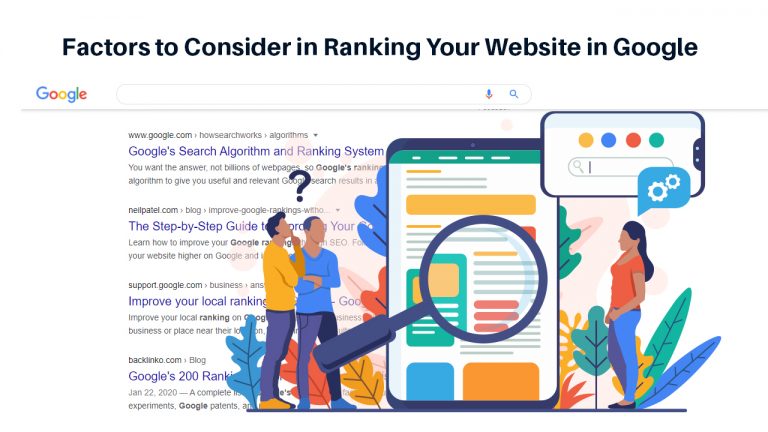For modern-day businesses, how do your customers find you?
The answer is pretty simple. They ask Google.
According to SEOTribunal.com, Google handles an average of 3.8 million searches per minute across the globe. If we do the Math, that’s about 228 million searches per hour, an average of 5.6 billion searches per day, or about 2 trillion searches per year!
If you don’t think of these digits as something significant, then you don’t know much about the power of Google.
People today are mostly online and spend most of their time utilizing the advantages of the Internet for their daily activities especially in finding answers for their queries.
In modern advertising, gone are the days that businesses need to get their products and services advertised in newspapers and magazines, or be seen in TV commercials to be able to introduce their brand to the public. Today, the primary goal of many brands and companies operating online is to be “Googled”.
When people key in their queries on search engines like Google, they expect to find the best answers possible. This is exactly the main goal of Google —- to provide the best possible search results for its users.
The thing about search engines is that it’s about rankings. This only means that websites need to earn their Google rank.
Many people wonder how Google rankings work. In this article, we will tackle the importance of SEO, why Google rankings are important, and the actual factors that are involved in SEO rankings.
What does Ranking in SEO mean?
If you have been engaging in digital marketing for your business, the term SEO isn’t some foreign word. SEO or Search Engine Optimization works on making web pages more likely to get ranked on Google. Its primary goal is to make your website to be as relevant to searches as possible.
Ranking refers to your website content’s position on the search engine results pages (SERPs) against a keyword. This is also why you need to know the Google keyword ranking for you to know which searchable keywords you can use to focus on your content.
The goal is to appear on the first page of SERPs. The higher your link is on the result page the better. Stats show that 95% of users searching in Google do not really make it past the first page of the search results.
What are the Factors To Consider In Ranking Your Website In Google?
SEO requirements keep changing because they have to be on par with Google’s Algorithm in ranking websites. With the latest upgrades of Google, website developers and owners must be in the know of Google’s developments. Doing so is a helpful way for your website and eventually, your brand to go from unseen to the most relevant websites in Google searches.
SEO’s concept may be easy to grasp but the actual work is challenging. This is why you need to hire a reliable digital marketing team that offers expert-level SEO services to do tedious tasks. Well, optimized websites get more organic traffic in the long run. More traffic means more leads and sales. Among all the other digital marketing strategies, SEO is an important strategy that you need to have for your business especially when you have a website.
Without SEO, Google users won’t be able to find your site.
Ranking factors are usually grouped into different factors and there are over hundreds of factors involved under these factors. What we will be discussing are some of the most important factors to consider to have a better ranking in Google.
ON-PAGE RANKING FACTORS
On-page factors are mainly related to the keywords and the content quality of your pages.
Keyword targeting
Keywords are the search terms that users key in when they go to search engines like Google when they want to know something. This is how Google knows what type of content they are looking for. Before any content writing, you must conduct keyword research for you to know which keywords people use when they want to know something which can be related to your niche or business.
Knowing what keywords are best to use will help you understand what your target audience is searching for and allows you to have an idea of the content that is relevant to their searches. Identify 4-5 related keywords that you want to target and incorporate them in a way that they fit and can be read naturally in the content.
Regardless of how you use the keywords in the content, it is still more important to write content with the readers in mind rather than write for Google. Google’s algorithm is designed to recognize keyword stuffing, a key term that describes how some marketers repeatedly and unnaturally use keywords when implementing SEO.
While keywords are the core of an effective SEO, the quality of your content should never be compromised if you want to rank higher in SERPs. Focus on compelling content that your audience can relate to and understand.
Content-Length
Write long but highly useful content. For Google, the quality of the content matters. It is also common sense that the longer the content, the wider the aspect of the content topic which will potentially give more information to the readers.
Title and header tags
Once you know the relevant keywords that you need to use in your content, insert the keywords in your titles and header tags. This will indicate to the search engine what the page is for it to index your page appropriately.
Meta description
The meta description is a short description that is displayed for each link on the result pages. This serves as a preview of the link which gives away information for searchers to know what the page is about increasing its click rate. Choose words that summarize the content to give your page a better description.
Use Image alt-text
Aside from texts, you can also utilize other media such as images to optimize your page. You can make use of images to send a signal to search engines through alt text, and captions. Alt text helps visually-impaired readers who rely on screen readers to access the Internet. It also helps your readers to know what the image is about in case the image fails to load.
URL structure
Avoid jumbled URLs with mixed characters. Your goal is to incorporate the target keyword on your URL to allow users to learn about the page. This now becomes an SEO-friendly website URL.
TECHNICAL RANKING FACTORS
This involves the overall performance of your page as a whole which includes loading speed, device compatibility, internal links, etc. Managing the technical aspects of a website is daunting since it requires knowledge of content management systems and web development. This is why it only makes sense to hire a web development team to build and optimize your website.
Site and page speed
Your website speed says a lot about the quality of your website. It’s not enough to have a professional-looking website to convert your users into actual customers and help it rank on the search engines. It needs to be optimized the way it should be starting on its website loading speed.
As a user, nobody likes to stay on a website that takes too long to load. If your website is loading slow, it’s most likely that other users will opt for better loading sites plus it is most likely that your bounce rate will skyrocket which generally affects your SEO ranking. Website speed is one important factor that Google considers in ranking a website and it is also what makes a website a good one.
Mobile Compatibility
Google utilizes mobile-first indexing when crawling websites which means they use the mobile version of the website when evaluating your page. This is mainly because online users do not only access search engines via desktop. People today opt for more convenience in accessing the Internet which is why a lot of people are using mobile to access online.
The goal here is to optimize your website in a way that they both work well on desktop and are compatible across any types of devices. like mobile phones and tablets.
Internal links
Search engines crawl from page to page through HTML links and indexing contents on your website. Internal links are links that you add to your content which leads your readers to other pages within your website.
Use quality links on your content so that search engines can easily understand and index your content. You can also add internal links to your website to better expound concepts on your content so that your readers won’t have to search for other websites to find answers for their queries. It makes your content easier to navigate and readers will realize that the answers that they are looking for can be found within your website.
OFF-PAGE RANKING FACTORS
These are being measured by Google elsewhere from your site, and primarily involve backlinks.
Backlinks
Backlinks are links that come from a page outside of your website. Backlinks are valuable tools for SEO because they represent a “vote of confidence” and add credibility to a website from one site to another. When your website is used as a backlink for another site, not only will the readers be led to visit your page but also it gives your page an impression that your website delivers quality content.
Climbing the search results pages takes time. SEO takes time.
However, it’s a long term efficient strategy that you can implement to your website. With Google having hundreds of factors they consider in ranking a website, you cannot expect for your website to magically skyrocket to No. 1 on search engines. But if you continue making your website as good as possible, you will soon enough see some growth on your website.
SEO allows you to optimize your website well enough for Google to take notice. Optimizing your website requires ongoing effort to keep your website functional and relevant for your audience.















